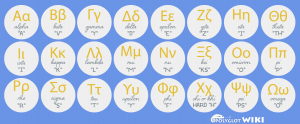Language/Modern-greek-1453/Grammar/Pronouncing-the-Greek-Alphabet
Pronouncing the Greek Alphabet[edit | edit source]
| Greek Letter | Letter Name | Pronunciation in Greek and sound syllable | Modern Pronunciation |
|---|---|---|---|
| Α α | Alpha | A like in fAther | |
| Β β | Vita | V like in Vet | |
| Γ γ | Gamma | Y like in Yes | |
| Δ δ | Delta | Th like in Those | |
| Ε ε | Epsilon | E like in Excellent | |
| Ζ ζ | Zita | Z like in Zoo | |
| Η η | Ita | I like in taxI | |
| Θ ο | Thita | Th like in THem | |
| Ι ι | Iota | Y like in Yodel | |
| Κ κ | Kappa | K like in marK | |
| Λ λ | Lamda | L like in Large | |
| Μ μ | Mi | M like in Modern | |
| Ν ν | Ni | N like in Never | |
| Ξ ξ | Xi | X like in neXt | |
| Ο ο | Omicron | O like in sOft | |
| Π π | Pi | P like in Pop | |
| Ρ ρ | Ro | Ro like in metRopolis | |
| Σ σ, ς (final) | Sigma | S like in muSic | |
| Τ τ | Taf | T like in Teach | |
| Υ υ | Upsilon | I like in machIne | |
| Φ φ | Phi | F like in Fan | |
| Χ χ | Chi | Ch like in loCHness | |
| Ψ ψ | Psi | Ps like in laPSe | |
| Ωω | Omega | O like in sOft |
One of the best things about learning the Greek language is that words are pronounced the way they are written. There are no silent "e" type letters.
If a letter is in the word, it is pronounced. And letters are always pronounced the same way, with the exception of a few diphthongs.
- The vowels are α, ε, η, ι, ο, υ, ω. The remaining letters are consonants.
Diphthongs (two-vowel sound syllable)[edit | edit source]
| Diphthongs | Pronunciation | Notes |
|---|---|---|
| αι | e | Pronounced ‘‘e” as in Shelf
παιδί – pedi – child |
| ει | i | Pronounced ‘ee’ as in Tree
ξενοδοχείο – xenothohio – hotel |
| αυ | af or av | Pronounced af as in Afford or ow as in Hour |
| οι | i | Pronounced ‘ee’ as in Tree
οικογένεια – ikoyenia – family |
| ου | ou | Pronounced oo as in Soup
ούτε – oute – nor |
| ευ | ef or ev | Pronounced ef or ev
ευφυΐα –effiîa – wit, intelligence ζευγάρια - zevgaria- couples |
- The accent is on a diphthong in the second vowel of the diphthong. Examples: ακούω (listen), είδα (I saw).
- The diaeresis is placed on the second vowel and indicates that the diphthong must be pronounced separately.
- Eg. : χαϊδεμένος : chaidemènos = caressed
Σ , σ , ς[edit | edit source]
- Sigma (Σ, σ, ς):There are three forms for the letter Sigma. At the beginning of the sentence or for proper nouns it is capitalized: Σ.
- When written at the end of a word, it is written like this: ς. If it occurs anywhere else, it is written like this: σ.
- Upsilon (Υ,υ):In the above table, we suggest that you pronounce this letter like "u" in "put".
The preferred pronunciation is actually more like the German "ü" as in "Brücke", or like the French "u" as in "tu".
If you do not speak German or French, don't worry about it, just pronounce it the way the table suggests.
- Ch (Χ,χ): This is the same sound as "ch" in "Bach", which does not sound like "ch" in "chair".
- The same sound occurs in the Scottish "Loch", as in "Loch Lomond", or the German "ach!".
Accents[edit | edit source]
• Greek words are all accented, which means that in each word, with the exception of monosyllables, a syllable is distinguished by a higher tone: one word = one accent.
This tonic accent is an essential component of the melodic rhythm of the Greek phrase.
It is subject to complex rules and always concerns a vowel among the last three syllables of the word. ie:
The accent can never go back beyond three syllables, from the end of the word.
Therefore, an acute accent can strike a vowel present in one of the last three syllables of a word.
Presents the three syllables we have words:
- oxyton: αγαθός: agathôs = good, of good quality
- paroxyton: λυμένος: lymenos = resolved, loosened
- proparoxyton: παράθυρο: paràthyro = the window
Graphic conventions regarding accent[edit | edit source]
The emphasis is on a diphthong in the second vowel of the diphthong.
- Examples: ακούω (listen), είδα (I saw).
The diaeresis is placed on the second vowel and indicates that the diphthong must be pronounced separately.
- Examples: χαϊδεμένος : chaidemènos = caressed
Author[edit source]
- Ευγενική χορηγία που στοχεύει να βοηθήσει μαθητές ή μη, απανταχού της Γης, που επιδίδονται στην εκμάθηση της ελληνικής γλώσσας!
- Contribution bénévole visant à aider les personnes, partout dans le monde, qui sont engagées dans l'apprentissage de la langue grecque !
- Voluntary contribution aimed at helping people, all over the world, who are committed to learning the Greek language!

